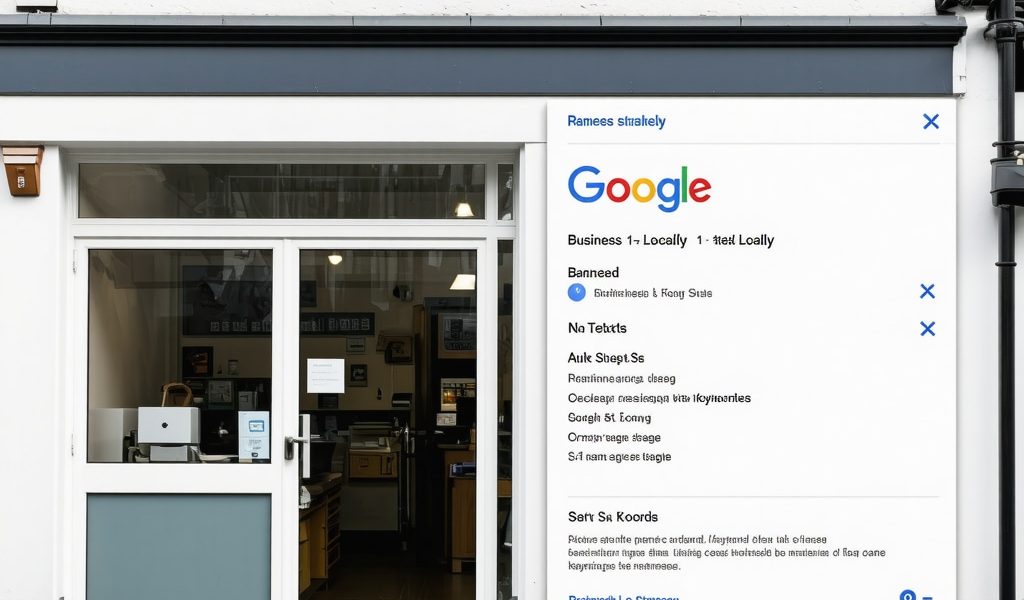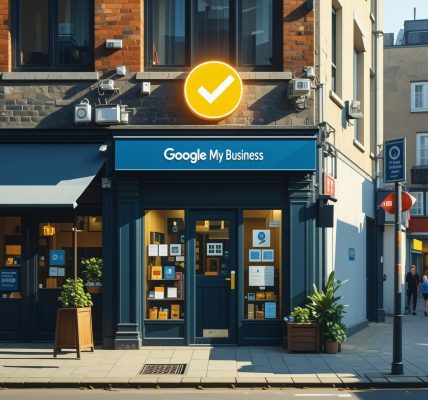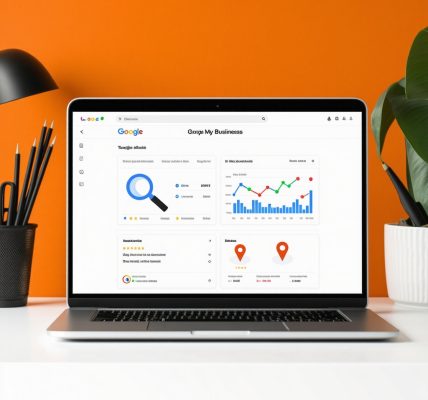Harnessing the Power of Precision Keywords in Google Business Profiles
In the fiercely competitive world of local search, securing the coveted #1 spot on Google Business listings requires more than just a basic setup. It demands a proven Google Business keyword strategy that intelligently targets local intent and user behavior. By carefully selecting and embedding the right keywords, businesses can dramatically increase their visibility in local searches, attracting high-quality leads and driving foot traffic.
Consider a boutique bakery in Austin, Texas, that integrated hyper-localized long-tail keywords like “gluten-free cupcakes Austin” and “best birthday cakes near Zilker Park.” Within weeks, their Google Business Profile climbed local rankings, outperforming competitors who relied on generic terms. This exemplifies how granular keyword research aligned with geographic and niche-specific queries can unlock powerful local SEO advantages.
Innovative Keyword Research Techniques Tailored for Local Dominance
To elevate your Google Business Profile effectively, start by leveraging tools like Google Keyword Planner and specialized local SEO software. These tools help identify high-intent search phrases your target audience uses, including “near me” queries, service plus location combinations, and trending local vernacular.
Equally important is analyzing competitor GMB listings to uncover gaps and opportunities. For instance, discovering a competitor’s missed keyword such as “emergency plumbing services downtown” can guide you to capture untapped search traffic. Integrating these keywords within your business description, services, and posts ensures your profile speaks directly to what local customers seek.
How Does Keyword Placement Impact Your Google Business Ranking?
What Are the Most Effective Ways to Embed Keywords Without Compromising Authenticity?
Keyword placement is a delicate balance. Overstuffing leads to penalties and a poor user experience, whereas strategic inclusion enhances relevance and ranking. The Google Business Profile allows keyword integration in multiple fields: business title, description, services, posts, and reviews.
Experts recommend naturally weaving keywords into your business description and posts, reflecting genuine language your customers use. For example, a landscaping company might describe their offerings by saying, “We provide expert organic lawn care services in Springfield tailored to your garden’s unique needs.” This approach maintains readability while signaling relevance to search algorithms.
Moreover, soliciting customer reviews that mention specific services and locations can amplify keyword presence authentically. Encouraging phrases like “best coffee shop near downtown” in reviews can boost local rankings significantly.
Unlocking Local Search Potential Through Continuous Optimization
Local SEO is not a one-time effort but an evolving strategy. Regularly updating your Google Business Profile with fresh content, seasonal keywords, and localized promotions keeps your listing vibrant and relevant. This dynamic approach signals to Google that your business is active, trustworthy, and engaged with the community.
Successful businesses often schedule monthly audits and content refreshes, leveraging insights from tools such as Google Analytics and Search Console to refine their keyword strategy. This ongoing optimization aligns with evolving search trends and customer preferences, ensuring sustained local dominance.
For a comprehensive dive into optimizing your Google Business Listing effectively, explore this expert guide that delves deeper into actionable tactics.
Empower Your Local Business Growth With Strategic Keyword Mastery
Mastering a proven Google Business keyword strategy is a gateway to unlocking unparalleled local search success. By combining precise keyword research, thoughtful placement, and continuous profile optimization, businesses position themselves at the forefront of local visibility.
Ready to transform your local Google Business ranking? Share your experiences or questions below to join a community dedicated to local SEO excellence and learn even more expert tips.
Authoritative research from Moz highlights that local search optimization, including keyword strategy, significantly influences Google Business rankings and customer engagement (Moz Local Search Ranking Factors).
Leveraging Semantic SEO to Enhance Google Business Profile Relevance
Beyond traditional keyword usage, semantic SEO plays a pivotal role in modern local search optimization. Semantic SEO involves understanding the intent behind search queries and providing contextually relevant information within your Google Business Profile. Through the integration of related terms, synonyms, and natural language variations, businesses can capture a broader spectrum of local search intents.
For example, a dental clinic might enrich their profile by including terms like “family dentistry,” “cosmetic dental services,” and “emergency tooth care” alongside their primary keywords. This approach not only improves discoverability but also aligns the profile with diverse user queries, enhancing local relevance and authority.
Harnessing the Power of Google Business Posts and Q&A for Keyword Amplification
Regularly publishing Google Business Posts offers a dynamic avenue to infuse targeted keywords while engaging your audience with timely updates, promotions, and events. Posts that incorporate localized keywords and compelling calls-to-action can substantially boost your profile’s visibility in local search results.
Similarly, actively managing the Q&A section by responding to customer inquiries with keyword-rich, informative answers reinforces your profile’s relevance. This interaction not only builds trust but also provides additional content that Google indexes, further enhancing your local SEO strategy.
How Can Advanced Citation Management Elevate Your Local SEO Game?
Exploring the Impact of Consistent and High-Quality Citations on Google Business Rankings
Accurate and consistent citations across authoritative local directories remain a cornerstone of effective local SEO. Citations that correctly list your business name, address, and phone number (NAP) validate your business’s legitimacy and trustworthiness in the eyes of search engines.
Moreover, leveraging professional citation management services ensures your listings are optimized and free from duplicates or errors that could dilute your local SEO efforts. High-quality citations from relevant industry and geographic directories signal authority and can significantly improve your Google Business Profile ranking.
According to Moz’s Local Search Ranking Factors, citation consistency is one of the top determinants influencing local search visibility and trustworthiness.
Integrating User-Generated Content and Visual Assets for Keyword Richness
User-generated content such as customer reviews, photos, and Q&A entries can be rich sources of keywords naturally embedded by your audience. Encouraging customers to mention specific services, products, and locations in their reviews not only enhances keyword diversity but also boosts authenticity and engagement.
Additionally, optimizing photos with descriptive filenames and alt text containing relevant keywords further supports your local SEO. For instance, a restaurant might upload images titled “vegan-pasta-dish-downtown-boston.jpg” with alt text emphasizing the dish and location, enhancing keyword signals to Google’s algorithms.
Stay Ahead with Continuous Learning and Profile Refinement
Local SEO trends and Google Business Profile features evolve rapidly. Staying informed through trusted industry resources and continuously refining your keyword strategy ensures your business remains competitive. Explore comprehensive insights and actionable tactics by visiting this complete guide to mastering Google Business SEO.
Engage with this content by sharing your own keyword optimization successes or challenges in the comments below. Your insights enrich the community and foster a collaborative path to local SEO excellence.
Unlocking the Potential of Structured Data: Schema Markup for Local SEO Mastery
In the evolving landscape of local search optimization, schema markup emerges as a powerful yet often underutilized tool to enhance your Google Business Profile’s visibility. Schema, a form of structured data, provides search engines with explicit clues about the meaning of your business information, allowing for richer search results such as enhanced snippets, knowledge panels, and localized features.
Implementing LocalBusiness schema types correctly on your website and linking it to your Google Business Profile can significantly increase your chances of appearing in coveted local packs. By embedding detailed attributes like business hours, accepted payment methods, geo-coordinates, and aggregate ratings, you craft a comprehensive digital fingerprint that search engines interpret favorably.
How Does Schema Markup Directly Influence Your Google Business Profile Rankings and Click-Through Rates?
While Google does not explicitly confirm that schema markup is a direct ranking factor, numerous SEO studies indicate that structured data enhances the quality of your listing’s presentation in search results. This often translates into higher click-through rates (CTR) due to the visual prominence and trust signals provided by rich snippets.
For instance, a restaurant utilizing Menu and Reservation schema can display actionable buttons and menu highlights directly within search results, streamlining user engagement. This improved user experience indirectly signals relevance and authority to Google, which can positively impact your local rankings.
Adopting schema markup also helps mitigate the risk of misinformation or inconsistencies by ensuring that all search engines access uniform, verified information about your business entity. This consistency is critical to maintaining and improving your Google Business Profile’s trustworthiness.
According to a detailed analysis by Search Engine Land on Structured Data, businesses with correctly implemented schema markup enjoy enhanced search result features, leading to increased visibility and engagement.
Leveraging Advanced Schema Techniques: Beyond Basics for Local SEO Experts
For seasoned local SEO professionals, it’s essential to go beyond basic schema implementation. Integrating Review schema that dynamically reflects user-generated content from your Google Business Reviews can create a powerful feedback loop of trust and keyword relevance. This approach not only enriches your profile’s snippet but also aligns your content with semantic search trends.
Furthermore, embedding Service schema that details your specific offerings with unique identifiers and descriptions can help Google associate your business with nuanced search intents. When combined with timely updates to your Google Business Posts and Q&A sections, schema markup forms the backbone of a sophisticated local SEO ecosystem.
Future-Proofing Your Google Business Profile with Schema and AI-Driven SEO Insights
The integration of schema markup with emerging AI-powered SEO tools offers unprecedented opportunities for continuous optimization. AI-driven platforms can analyze your structured data’s performance, suggest schema enhancements, and automatically update your profiles to reflect changing consumer behaviors and search patterns.
By embracing this forward-thinking strategy, businesses not only enhance their immediate local search presence but also build resilience against algorithmic shifts, ensuring sustained growth and competitive advantage in their market.
Engage with this advanced approach to schema markup and share your experiences or questions to deepen your expertise in local SEO innovation. Explore more at Search Engine Land’s definitive guide on structured data to elevate your Google Business Profile’s impact.
Decoding the Synergy Between Schema Markup and AI in Local SEO Evolution
As the digital ecosystem becomes increasingly sophisticated, the intersection of schema markup and artificial intelligence (AI) heralds a transformative era for Google Business Profile optimization. AI-powered SEO tools now analyze vast datasets to identify opportunities for structured data enhancements, enabling businesses to refine their schema implementations dynamically.
These intelligent platforms can predict shifting consumer search behaviors, recommend precise schema attributes, and even automate updates to maintain alignment with Google’s ever-evolving algorithms. This synergy not only amplifies local search visibility but also ensures your profile adapts proactively rather than reactively.
How can integrating AI-driven schema optimization tools revolutionize your local SEO strategy?
By leveraging AI-driven schema optimization, businesses gain a competitive edge through real-time insights and actionable recommendations tailored to their unique market niche. For instance, an AI tool might detect emerging local search trends indicating increased interest in “contactless curbside pickup” services and suggest incorporating corresponding Service schema to capture this intent.
Furthermore, AI enhances error detection in schema markup, preventing common pitfalls like malformed JSON-LD scripts that could compromise your profile’s structured data benefits. The automation of these processes frees SEO specialists to focus on strategic content creation and deeper market analysis.
According to Search Engine Land’s comprehensive guide on structured data, businesses embracing AI-powered schema strategies experience notable improvements in both search result prominence and user engagement metrics.
Harnessing Voice Search Optimization Through Schema and Conversational AI
The surge in voice-activated local searches necessitates a nuanced approach to schema implementation. By embedding conversationally tuned schema markup and optimizing for natural language queries, businesses can better position their Google Business Profiles to capture voice search traffic.
Integrating FAQPage schema that reflects commonly asked questions and answers enriches your profile with content tailored for voice assistants. Complemented by AI-driven content generation tools, this strategy ensures your responses align with evolving voice search patterns, enhancing both discoverability and user satisfaction.
Mastering the Intersection of Visual SEO and Structured Data
Visual assets augmented with schema markup represent an advanced frontier in local SEO. Embedding ImageObject schema with detailed metadata such as captions, geo-tags, and keywords elevates image indexing and relevance within local search results.
Optimizing images with structured data not only improves your Google Business Profile’s aesthetic appeal but also enhances semantic richness, signaling to search engines a well-rounded, authoritative presence. This dual optimization leverages both textual and visual signals to dominate local SERPs.
Engage With Cutting-Edge Local SEO Innovations
Elevate your Google Business Profile by embracing these advanced schema and AI-driven strategies. Stay at the forefront of local SEO by continuously integrating innovative technologies that deliver measurable impact.
Invite your peers and SEO experts to discuss these sophisticated techniques—share your challenges, successes, and insights to foster a vibrant community dedicated to pushing the boundaries of local search excellence.
Frequently Asked Questions (FAQ)
What is the most effective way to select keywords for a Google Business Profile?
The most effective approach combines thorough local keyword research using tools like Google Keyword Planner with competitor analysis to uncover high-intent, location-specific terms. Prioritize long-tail keywords that reflect user intent and local vernacular, ensuring they align naturally within your profile’s description, services, and posts for maximum relevance and engagement.
How can schema markup improve my Google Business Profile’s local SEO?
Schema markup enhances your profile by providing structured data that helps search engines better understand your business details, such as services, hours, and reviews. This can lead to rich snippets and improved visibility in local search results, indirectly boosting click-through rates and authority without directly affecting ranking algorithms.
Is it beneficial to continuously update my Google Business Profile with new content and keywords?
Absolutely. Continuous optimization signals to Google that your business is active and engaged, maintaining relevance amid evolving search trends. Regularly updating posts, reviews, and keyword integrations keeps your profile fresh, improves local rankings, and helps capture emerging search intents.
How do user-generated content and reviews influence keyword strategy?
User-generated content naturally incorporates authentic keywords related to your services and location, enriching your profile’s keyword diversity. Encouraging customers to mention specific services and locations in reviews amplifies keyword presence organically, enhancing trust and local SEO simultaneously.
Can AI-driven tools assist in optimizing schema markup for local SEO?
Yes, AI-powered SEO platforms analyze your structured data’s performance, recommend improvements, and automate updates to stay aligned with search algorithm changes. This dynamic approach helps maintain accuracy, capture new keyword opportunities, and prevent errors in schema markup implementations.
What role do Google Business Posts and Q&A play in keyword amplification?
Google Business Posts and the Q&A section provide dynamic spaces to incorporate targeted, localized keywords naturally. Regularly publishing keyword-rich posts and responding to customer questions with informative answers boost profile relevance, enhance user engagement, and supply additional indexed content for Google.
How important is citation consistency for local SEO?
Citation consistency across authoritative directories is crucial as it validates your business legitimacy and trustworthiness. Accurate and uniform Name, Address, and Phone Number (NAP) data helps prevent ranking dilution and supports higher local search visibility by signaling reliability to search engines.
Does keyword stuffing in my Google Business Profile help improve rankings?
No, keyword stuffing can lead to penalties and degrade user experience. Instead, focus on natural, relevant keyword integration that reads authentically and provides value to potential customers. Quality and context always trump quantity in local SEO keyword strategies.
How can I optimize my profile for voice search?
Optimizing for voice search involves using natural language keywords and implementing schema types like FAQPage to answer common queries conversationally. This aligns your content with how users speak their searches, improving chances of appearing in voice assistant results.
What advanced schema types should local SEO experts consider?
Beyond basic LocalBusiness schema, experts should implement Review schema for dynamic user feedback, Service schema detailing offerings, ImageObject schema for visual assets, and FAQPage schema for common questions. These enrichments enhance search result features and semantic relevance.
Trusted External Sources
- Moz Local Search Ranking Factors – Provides in-depth analysis of key ranking signals for local SEO including keyword strategy, citations, and reviews, offering data-driven insights critical for Google Business optimization.
- Search Engine Land’s Guide on Structured Data – An authoritative resource explaining schema markup implementation, its impact on search listings, and advanced techniques integrating AI and voice search optimization.
- Google’s Official Keyword Planner Tool Documentation – Essential for understanding keyword research methodologies and identifying high-intent local search terms relevant to your business niche.
- BrightLocal’s Local SEO Industry Reports – Offers comprehensive studies on local SEO trends, citation management, and user-generated content strategies, grounding keyword tactics in current market realities.
- Local SEO Expert Blogs (e.g., Whitespark, Sterling Sky) – Provide practical, up-to-date guides and case studies on advanced Google Business Profile optimization tactics, including semantic SEO and continuous profile refinement.
Conclusion
Mastering a proven Google Business keyword strategy is essential for dominating local search rankings and driving meaningful customer engagement. By integrating precise keyword research, natural and strategic keyword placement, and leveraging advanced tools such as schema markup and AI-driven insights, businesses can significantly enhance their Google Business Profile’s visibility and authority.
Continuous optimization, including fresh content updates, citation consistency, and active management of reviews, posts, and Q&A, ensures sustained relevance in an ever-evolving search landscape. Embracing semantic SEO and structured data not only enriches your profile’s contextual depth but also future-proofs your local SEO efforts against shifting algorithms and emerging technologies like voice search.
Take action today by applying these expert strategies, sharing your experiences, or exploring further expert content to elevate your local business growth. Engage with this community and lead your market through informed, innovative Google Business Profile optimization.




The concept of hyper-localized keyword strategies really resonated with me, especially the example of the bakery in Austin using very specific search phrases like “gluten-free cupcakes Austin.” In my experience managing a local pet grooming service, generic keywords were often drowned out by bigger competitors. When I switched to targeting very precise keywords incorporating neighborhood names and specific services like “eco-friendly dog grooming in Brookline,” I noticed a significant boost in local inquiries. It’s fascinating how understanding and aligning with local vernacular and user’s immediate needs can transform visibility.
However, I still struggle with maintaining authenticity while optimizing keywords. The balance between embedding keywords naturally and avoiding keyword stuffing sometimes feels challenging. Do any other local business owners or SEO experts have tips on how to stay authentic in the business description and posts without compromising SEO effectiveness? Also, how often do you review and update these keywords to keep up with changing search trends? The continuous optimization aspect mentioned really intrigues me, but I wonder about practical workflows to implement that effectively. Looking forward to hearing others’ perspectives and experiences on sustaining this balance in local SEO.